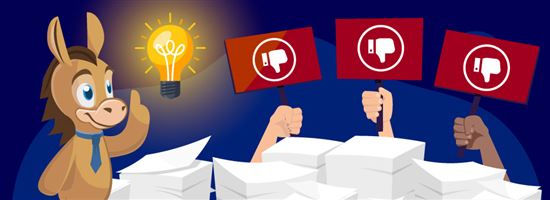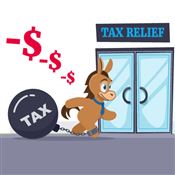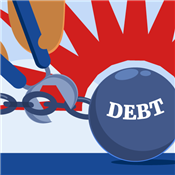National Debt Relief Complaints
National Debt Relief is a company trusted by thousands of clients. But its services aren't problem-free. Here's what you need to watch out for.
 |
Negotiating with your creditors is already risky business. What more if the debt relief company you signed up for offers other sets of problems.
Although National Debt Relief is a reputable company, it comes with issues that can make or break your decision when signing up.
Read on to learn the common National Debt Relief complaints and what you can do about them.
Most Common National Debt Relief Complaints
Here are some of the most common National Debt Relief complaints, together with their solutions.
Yes, you can trust National Debt Relief. It is a legitimate company that has been offering debt relief services since 2009. It has helped over 550,000 clients reduce their debts and achieve financial freedom.[1] Plus, it's accredited by the Better Business Bureau with an A+ rating.
Creditors Filed A Lawsuit
It sounds scary, but creditors can actually file a lawsuit for your unpaid dues. And that's exactly what happened with some of National Debt Relief's clients.
With a National Debt Relief program, you'll intentionally miss payments. This is what can lead creditors to take legal action.
Solution:
If creditors file a case against you, the first thing you need to do is assess your Statute of Limitations (SOL).
If the debt is past the SOL, creditors don't have any legal grounds in their case, especially if they aim to collect your balance. Call National Debt Relief to correspond with creditors.
The SOL is the period when creditors can take legal action for your unpaid debts. SOLs range from 3–6 years (starting at the date of your last delinquency), depending on your state.[2]
The expiration of SOLs means creditors can't file a case against you to go after your debt. Nonetheless, it doesn't extinguish the debt. This means you'll still owe your creditors something, and the debt responsibility doesn't go away just because the timeframe for lawsuits has expired.
But let's say you are within the SOL. National Debt Relief has a network of attorneys who already know what to do and how to negotiate your case.
You're likely to come up with an arrangement with your creditors regarding payment and avoid further damage to your credit from default judgments.
It's in your best interest to have an action plan for the lawsuit since most creditors may win their case if you choose to ignore it.
Lower Credit Scores
Debt relief companies request you to intentionally miss your dues (if you haven't already), affecting your credit score immensely. Missed payments result in negative remarks on your credit report.
Solution:
You can add more positive transactions to your credit report by paying unenrolled debts on time. Reducing your credit utilization ratio can help as well.
Also, in your client portal, continuously monitor changes in your debt so you can approve the new amount right away. The sooner you get to settle, the sooner you can pay off your debt.
There should be gradual improvements to your credit once you settle the debts.
National Debt Relief programs can be bad for your credit since missing payments intentionally can bring down your credit score. But when you get to settle for a lower debt amount, then you have a better chance of paying off your debt, which can be good for your credit. However, it's definitely a risk since it's not guaranteed that creditors will settle for a lower debt amount.
You Don't Always Get To Save Money
The point of debt relief is to save money from your reduced debts. But many clients have ended up spending a lot of money on fees and other charges, kind of defeating the purpose of the program.
Solution:
Be proactive in clarifying your fees from National Debt Relief's service. The website states that your fee will cost 15–25% of your enrolled debt.[3] Take note that the larger your enrolled debt is, the larger the fee will be.
Let's not forget the likelihood of a lawsuit happening once you start your program. Lawsuits can turn expensive for both you and the creditor. You can ask National Debt Relief if they can recommend attorneys to assist you, but take note that it is a separate cost from your program.
Fees and savings are generally something you can clarify and estimate during your initial consultation and program enrollment.
Confusing Services
National Debt Relief isn't always clear or transparent with its services. Many clients didn't know what to expect and ended up quitting halfway through their program.
A lot of clients didn't know how long it would take. Many of them could no longer afford the monthly payments.
Solution:
A National Debt Relief representative should walk you through the service before you commit to a program. Ask all your questions during your free consultation before you sign any contract.
Ask for a breakdown of potential fees, the process, and milestones in your service. This way, you can set your expectations properly. It's best to make sure you can commit to making the payments for the entire program.
If you still find yourself confused or if you have any concerns, you can contact National Debt Relief's customer support at 888-660-7427. The support team is available from Monday to Friday, 10:00 AM to 08:00 PM EST.
You Can't Access your Funds
When you sign up for National Debt Relief, they'll ask you to create an FDIC-insured trust account. This will be a dedicated account where you'll deposit money regularly.
You can't use it for other things other than debt repayment. However, you do have complete control of this account, and you will be the one approving or rejecting the settlement amounts.
Solution:
The primary purpose of your dedicated account is to keep your monthly deposits that are strictly for your program. That way, you eventually accrue enough money to serve as a lump sum payment for your debts plus National Debt Relief's fees.
There is no way around that. But you will be able to get your money back if you ever decide to cancel the service.
Any account activity will also be transparent until you complete your program. So, you'll always have an overview of your deposits, debt payments, and National Debt Relief's fees (which you approved).
The Program Takes Too Long To Complete
Debt relief takes a lot of time, especially if you are after ideal results. National Debt Relief services can last years, especially for people with large debts and more creditors.
National Debt Relief disclosed that its most successful clients have stayed in the program for over 24 months. But some clients stay for as long as 48 months to get to the ideal debt situation.[5]
Solution:
Go over the terms in your program to set timelines. You must also set proper expectations since debt relief is not an overnight process. Any company that promises speedy results is most likely operating on a scam and will not help you relieve debts.
The length of time for negotiations varies for each creditor. It may be easier to negotiate with some of your creditors. For others, it may be tougher and thus will require more time.
Although debt relief can take years, in the end, you're debt-free. In comparison, if you only make the minimum credit card payments every month, it may take 10-20 years to pay it off.
It's Difficult To Cancel the Service
Many clients found it difficult to end their service after signing up and paying for National Debt Relief. You'll need to contact customer support to end your service, or you'll continue to be charged every month.
Clients left a mix of feedback on their cancellation process. That said, it wasn't always easy. For example, Marci H.'s recounted their experience in a BBB complaint.
Solution:
Here are the steps to canceling your National Debt Relief program:
- Contact customer support at 888-660-7427 (available from Monday to Friday, 10:00 AM to 08:00 PM EST) and tell them that you will be canceling your program.
- Fax your Notice of Cancellation form to 888-688-3291.
- Send a soft copy of the signed and dated Notice of Cancellation to service@nationaldebtrelief.com (optional).
You can call National Debt Relief's customer support if you need to follow up on your cancellation notice.
Yes, you can get your money back because you control your dedicated savings account. If you want to cancel your program, ensure you do not agree to any negotiated amount in your client portal. National Debt Relief may charge you for some applicable fees depending on the progress of the debt negotiation.
Additional Tax On Forgiven Debt
The government can tax you for the forgiven debt, which now belongs to taxable income. You'll need to settle any taxes and fees related to that forgiven amount.
You must report the forgiven portion of your debt if you save more than $600 on a particular debt. The tax rate for the forgiven debt ranges from 10–37%, depending on your income bracket and filing status.[6]
Solution:
Unfortunately, you can't avoid paying taxes if you're forgiven more than $600 worth of debt. But what you can save is a lot more than whatever taxes you will pay.
The $600 threshold applies to each creditor, not your total enrolled debt. Tax provisions apply depending on your case, but ultimately, your creditor should issue you a Form 1099-C to officially state your forgiven debt portion.[7]
Fees are Expensive
National Debt Relief charges anywhere from 15-25% of your total enrolled debt for their services. It doesn't include other costs like interest in consolidation loans, applicable penalties for missed payments, or legal fees.
Solution:
National Debt Relief features a Satisfaction Guarantee:
Only approve the settlement amount if you are satisfied with it. You can also call National Debt Relief to break down the settlement amount to understand where your payment will go.
You may consider other debt relief options, too. Although, most debt relief companies charge within National Debt Relief's percentage range.
Customer Reviews
National Debt Relief has profiles on numerous online platforms. Below are some of their average ratings from review platforms.
| PLATFORM | AVERAGE RATING |
|---|---|
| Consumer Affairs | 4.90 out of 5 ★ from over 50,000 reviews |
| Trustpilot | 4.70 out of 5 ★ from over 37,000 reviews |
| Google Reviews | 4.60 out of 5 ★ from over 5,000 reviews |
| Better Business Bureau (BBB) | 4.69 out of 5 ★ from over 2,000 reviews |
Overall, National Debt Relief gets highly positive reviews. Clients say the reps are helpful and courteous; and the process is efficient and often faster than expected. However, there are some clients who did not have a good experience.
Alicia's story is an example of how you can get a lawsuit from your creditors for failure to pay for debts.
Meanwhile, Peter's story recounts how his credit score has dropped with no communication from National Debt Relief at all.
However, it's not all 1-star ratings and horror stories despite some complaints against National Debt Relief. After all, it has helped hundreds of thousands of people relieve their debts like Karen's story below.
And, Theodore states how National Debt Relief has surpassed expectations.
National Debt Relief has a mix of both positive and negative reactions from clients. When signing up for debt relief, it's always good to know the process of the company. That way, you can slowly set expectations on your progress.
Want to know how the company works? Read on to find out how National Debt Relief operates.
National Debt Relief Process
If you're set on working with National Debt Relief, here are the steps to take to get started:
- Start by scheduling a free consultation to discuss your debt relief options and personalized program.
- Create an affordable plan based on what you can pay.
- You'll set up a dedicated account where you will make your deposits for the entire program.
- National Debt Relief will negotiate with your creditors (this can take weeks to months to get the best reduced amount).
- If you approve the negotiated amount, you'll pay it using the accrued funds in your dedicated account.
It can take years to settle your debts with National Debt Relief. Most of National Debt Relief's successful clients are enrolled in their program for 24–48 months.[5] It all depends on what you have agreed upon and discussed during the initial consultation before you signed your contract.
If National Debt Relief is not for you, check out these alternatives.
National Debt Relief Alternatives
Here are other options you can consider if National Debt Relief isn't cut out for your debts.
National Debt Relief vs. Freedom Debt Relief
Freedom Debt Relief has helped over 850,000 clients, resolving over $15 billion in debt.[9] It's been in the industry longer than National Debt Relief, but it covers fewer types of unsecured debts.
Freedom Debt Relief's edge is that it partners with Legal Partner Network. You have access to expert debt negotiators who can still negotiate for your debts at lower amounts even if a creditor is taking legal action against you.
The best part is that the fees for these attorneys and other professionals are part of the service fee. Freedom Debt Relief costs the same as National Debt Relief (15–25% of your enrolled debts).[10]
National Debt Relief vs. Accredited Debt Relief
Accredited Debt Relief offers consolidation options to help you merge multiple debts into one. Accredited Debt Relief costs the same as National Debt Relief, and it has helped over 300,000 clients consolidate debts to pay off over $3 billion debts.[11]
National Debt Relief vs. Debt Management Plans
Instead of working with a debt relief company, you can go to a credit counseling agency for a debt management plan (DMP). It's a structured repayment plan for strategizing the best way to pay off debt in less time and in lower amounts.
DMPs often cost significantly less with fixed monthly rates and service fees that are not percentage-based. Typically, they last 3-5 years.
Licensed credit counselors from nonprofit credit counseling agencies will monitor your plan to ensure you settle your dues on time. You can focus on paying off one monthly due only since you consolidated multiple debts of the same type into one.
Bottom Line
No debt relief option is perfect. All companies will have all types of remarks from different people.
Knowing about National Debt Relief's customer complaints can help you find solutions to similar problems you encounter.
They also provide a fuller picture of National Debt Relief's services. This way, you don't just focus on the benefits of their debt relief programs, but you get to understand the risks as well.
References
- ^ National Debt Relief. Our Track Record, Retrieved 10/21/2023
- ^ Consumer Financial Protection Bureau. Can debt collectors collect a debt that's several years old?, Retrieved 08/16/2023
- ^ National Debt Relief. FAQs: What will your service cost me?, Retrieved 10/21/2023
- ^ National Debt Relief. FAQ: Do You Offer A Satisfaction Guarantee?, Retrieved 11/6/23
- ^ National Debt Relief. FAQs: How Long Will It Take To Get Out Of Debt?, Retrieved 10/21/2023
- ^ IRS. IRS provides tax inflation adjustments for tax year 2023, Retrieved 10/21/2023
- ^ IRS. Topic No. 431, Canceled Debt - Is It Taxable or Not?, Retrieved 09/06/2023
- ^ IRS. About Form 1099-C, Cancellation of Debt, Retrieved 09/06/2023
- ^ Freedom Debt Relief. Why choose Freedom Debt Relief, Retrieved 10/21/2023
- ^ Freedom Debt Relief. FAQs: How much does debt relief cost?, Retrieved 10/21/2023
- ^ Accredited Debt Relief. Our Track Record, Retrieved 10/21/2023
Imagine Living Life Without Debt
- Get a free savings estimate today
- See how quickly you can be debt free
- No upfront fees and no obligation
Write to Alex Mambaje at feedback@creditdonkey.com. Follow us on Twitter and Facebook for our latest posts.
Note: This website is made possible through financial relationships with some of the products and services mentioned on this site. We may receive compensation if you shop through links in our content. You do not have to use our links, but you help support CreditDonkey if you do.
|
|
|
Compare:



